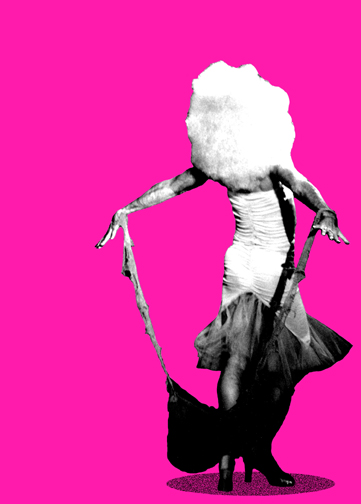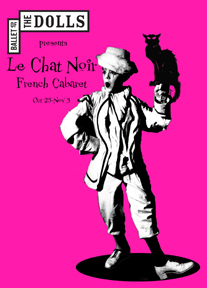The Thrill of “La Dolce Vita”
Lightsey Darst delights in the campy pleasures and fabulous costumes of Ballet of the Dolls' Italian Cabaret, "La Dolce Vita," on stage at Minneapolis' Ritz Theater through March 15.


THE BALLET OF THE DOLLS’ LA DOLCE VITA SHIMMIES around a story reminiscent of the musical Grease: a poor, bored goody-two-shoes, slurping her spaghetti alone, and so pious that at one point she actually kneels and crosses herself, is progressively freed of her inhibitions and her clothes by a pack of Mafiosi, a lover with a wayward rose, a commedia dellarte troupe, and finally a roving band of Sophia Lorens and their lusty escorts. Our good girl reaches her apotheosis dancing giddily on a table, wearing only her old-fashioned (that is, sexy) underwear. This story of the life-giving power of getting tarted up probably doesnt strike the Dolls as odd, given the number of lace body-stockings, garter belts, stretch paisley pants, and dresses slit up to there in their communal wardrobe. It doesnt seem so odd when youre watching the Dolls dance it, either: theyre pros at preaching an accessible message of embracing your sexual power.
First in the Dolls arsenal of conversion comes costume. In what must be the most uproarious sewing bee in town, the Dolls make their own. This is no slapdash effort, either. Take Stephanie Fellers Columbine dress: a black bodice with blood-red bra cups, flouncy sleeves, and a crinoline skirt. Or the Armani-inspired metallic sheaths for the mob molls, or their paramours cocky, blousy suits. The Dolls cut no corners: always a different style for each dancer, always accessorized, always the right (that is, sexy) underwear peeking out from underneath. And each costume glamorizes the wearer. The Dolls costume closet is full of outfits your mother did not want you to wear for fear of what you would do in that dress, in that open-chested shirt. The Dolls arent afraid; theyre eagerly awaiting their next gorgeous transformation.
The Dolls roles, like their costumes, are stock parts most people harbor secret desires to enact: the good girl letting herself be seduced, the raffish seducer, the earthy sex goddess, the magician, the bad girl, the wild child. Ive never seen the Dolls invent a new character, but why should they? Literature and pop culture have spewed up enough of these archetypes to keep the Dolls busy for the next century. Anyway, the Dolls depend on audience recognition; they dont specialize in unfolding character but in playing with expectations. Here, befitting the Italian theme, we get Italian types; but its easy to imagine the Dolls putting on a smashing Gigi, or Carmen, or even Magic Flute.
Magic Flute? Sure, the Dolls could handle it, because they throw themselves into their roles without the least bit of self-consciousness. And theyre good dancers. Myron Johnson, artistic director and choreographer, is not exactly a choreographic innovator. Beyond forging his particular blend of jazz and ballet, he doesnt create much thats novel. But he knows his dancers, and he knows how to create dances that bring out their strengths. My eyes been drawn to almost all the Dolls in the past, but in this performance Stephanie Fellner and Stephanie Karr-Smith especially shine. Fellner is a human sketch. Jagged, angular, sometimes winningly gawky, shes a Fosse type, and Johnson gives her vampy roles, strung out roles, always lots of legs and posing, the better to use her neon cursive. Karr-Smith is completely different: smooth and neatly coordinated. Johnson takes advantage of her ballet training, showing off her trimly articulated steps, her exact carriage. At the same time, shes no bunhead: feline pleasure in moving and sweet timing save her from that. All the Dolls are different, but Johnson pays attention to each one. Perhaps its in Johnsons directing that the Doll message comes through clearest: however different you are, youre all kings and queens, he seems to say. The result? A stage full of good-looking but individual movers, all radiating pleasure.
La Dolce Vita is the second national cabaret in the Dolls season (the uproarious French cabaret played to enthusiastic crowds last fall). The basic idea: Johnson pillages national stereotypes and popular exports, piling up familiar songs (Volare opens La Dolce Vita), costumes, and characters. All together, its a lot of fun, particularly if you patronize the Ritz bar, which is just what the Dolls encourage you to do. La Dolce Vita is not the outrageous smash of the French cabarettoo bad. (A solo by Myron Johnson, performed only at the March 8 10 pm show, might alter that.) Still, its a chance to see the Dolls in all their campy glory and revel in their familiar, but always effective, message: strip down to your lovely selfand your black merry widow.
About the writer: Lightsey Darst writes on dance for Mpls/St Paul magazine and is also a poet and editor of mnartists.orgs What Light: This Weeks Poem publication project.
What: La Dolce Vita: An Italian Cabaret
When: Performances through March 15
Where: The Ritz Theater, Minneapolis, MN
Tickets: General admission $25 (some discounted tickets available)